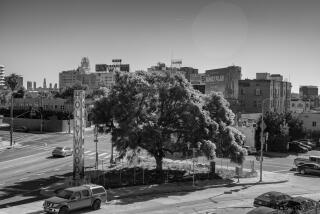In his own way, he towered like the forest
- Share via
I find it hard to believe that Jack McKellar died peacefully in his sleep. He just wasn’t the type.
Here was a man of the north woods who cast himself in the image of animals that once ruled the forests and the air above them.
“If you’re going to be a bear,” he’d roar in the lumberjack bars around Eureka, Calif., “be a grizzly!” And he was at that, at 6-foot-3 and 250 pounds, big and intimidating, standing tall even among the redwoods.
In later years, he’d talk about the old age of eagles and saw himself soaring over an environment he was once a part of, observing from afar those secret places in the woods “where the monkeys chased the hoot owls.”
If ever a man was the type to heed a poet’s call not to go gentle into that good night, McKellar was the one. His presence was ominous and his death the other day at age 83, a graceful descent into darkness, was unlikely. One would expect more of a growl to mark his reluctant passage.
Just as the grizzlies and the eagles have disappeared from the forests McKellar loved, so too was he becoming an anomaly. A lumberjack once, he was vocal in supporting their right to exist as the mills were forced out of existence by an army of environmentalists who stood between the redwoods and the saws that endangered them.
I met him in the 1980s when unemployment among the woodsmen was shrouding the North Coast in despair. McKellar had given up logging by then to work for the Army Corps of Engineers, but he remained at war with those who wanted the mills shut down completely, ignoring the human element that was suffering as a result.
He called himself “the redneck of the redwoods” and delighted in challenging the influx of tree-huggers who were making Eureka the focal point of their war on the clear-cutting of timber in the hills around the coast.
When roaring alone wasn’t scaring them away, he entered politics, first winning a seat on the Del Norte County school board and then on the Eureka City Council. His open battles with the environmentalists are the stuff of legend. Challenged by a woman who wanted logging ended, he demanded to know whether she used toilet paper occasionally and then, playing the grizzly, roared that without wood there’d be no paper and then what in the hell would she do?
Scarred by barroom battles and by his career in the woods, McKellar was one of the few crushed by a falling tree who lived to tell about it. A 9-ton log, cut down from a hill above, rolled over him, breaking bones and tearing up his insides, but he rose again like the grizzly that he was, bellowing defiance at what surely would have killed an ordinary man. “They thought I was dead,” he said to me with a grin, recalling the incident years later, “but I wasn’t.”
We were nothing alike in politics or environmentalism but I came to admire the man for what he was: honest, forthright and, in his gruff, iconoclastic way, good humored. I’d look him up anytime work took me to the north country, and we’d meet in the bar of the old Red Lion Inn, where he’d pound the table to make a point and glower as he looked around for anyone about to challenge him.
An adversary called him a force of nature, and that was still evident even as his days of heavy boozing and brawling ended. But he was a poet too, conjuring up images of monkeys and hoot owls to define those dark places in the woods that few actually saw and no one truly understood. As the eagle in him slowed to the heaviness of passing years, he defined that too in periodic telephone calls to find out how his “short, liberal little friend” was doing in L.A.
Our last conversation was a few weeks ago, and I guess I could tell then that a lot of the roar had gone out of the old grizzly’s voice. Called upon to redefine himself in the image of the area he loved, he’d probably see himself as one of the free-flowing rivers that creased the hills and rolled past the redwoods on a mission to the sea, churning into the wild and beautiful coastline at the completion of a long journey.
His wife, Miriam, said that at the end, he just quietly slipped away. She and McKellar’s daughter, Monica, were at his bedside when he died of congestive heart failure, so I guess they ought to know. But I prefer to see him as the old bear that roared a warning to the impending darkness, because he was larger and truer than the darkness itself.
We were unlikely friends, bound by a respect for each other’s way of life and by the poetry that springs from quiet places of the soul. He was a good man, taller than even his own physical stature, and I wish him the peace he deserves in the clouds where eagles soar, and in forests where the monkeys and the hoot owls play.
More to Read
Sign up for Essential California
The most important California stories and recommendations in your inbox every morning.
You may occasionally receive promotional content from the Los Angeles Times.













